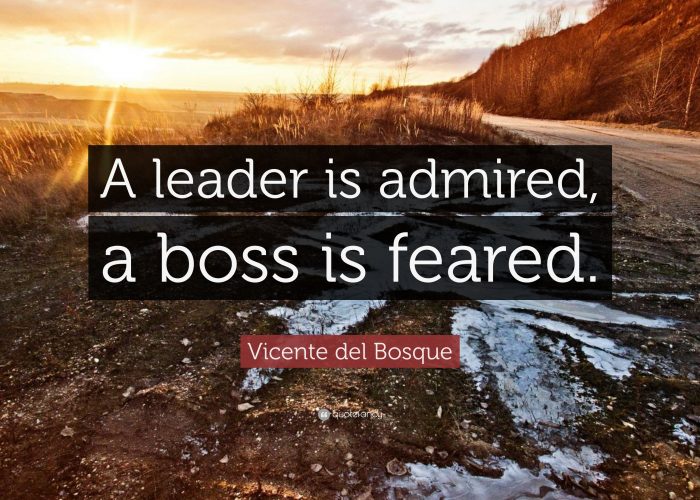



A good leader plays a good role model in the team and know how to enable others to act upon the same goal.
ARE there any leaders that you find particularly charismatic? Is it Steve Jobs? Elon Musk? Dalai Lama? Was it your high school teacher? Or was it the basketball team leader when you were in college? Or is it your manager at work?
A good leader plays a good role model in the team and know how to enable others to act upon the same goal. It’s always difficult for a single person to make a really great impact. A good leader understands this and will try their best to motivate and enable the team to achieve greatness together.
Great leaders come in all shapes and sizes, but despite the vast differences in professions and backgrounds, there are certain things that all great leaders have in common. Here’re the characteristics of a leader.
Great leaders know that they won’t have a happy and motivated team unless they themselves exhibit a positive attitude. This can be done by remaining positive when things go wrong and by creating a relaxed and happy atmosphere in the workplace.
Even some simple things like providing cupcakes or beers on Fridays can make the world of difference. An added perk is that team members are likely to work harder and do overtime when needed if they’re happy and appreciated.
Even in the worst situations such as experiencing low team morale or team members having made a big mistake at work, a great leader stays positive and figure out ways to keep the team motivated to solve the problems.
What you can do:
Role mode: Walt Disney
All great leaders have to exhibit an air of confidence if they’re going to succeed. Please don’t confuse this with self-satisfaction and arrogance. You want people to look up to you for inspiration, not so they can punch you in the face.
Confidence is important because people will be looking to you on how to behave, particularly if things aren’t going 100% right. If you remain calm and poised, team members are far more likely to as well. As a result, morale and productivity will remain high and the problem will be solved more quickly.
If you panic and give up, they will know immediately and things will simply go down hill from there.
What you can do:
You can’t instantly become a very confident person, but all the small things you do every day will gradually make you more confident.
Role model: Elon Musk
It’s imperative for any kind of leader to have a sense of humor, particularly when things go wrong. And they will.
Your team members are going to be looking to you for how to react in a seemingly dire situation. It would probably be best if you weren’t stringing up a noose for yourself in the corner. You need to be able to laugh things off, because if staff morale goes down, so will productivity.
Establish this environment prior to any kind of meltdown by encouraging humor and personal discussions in the work place.
What you can do:
Role model: Barak Obama
No matter how hard you try to avoid it, failures will happen; that’s okay. You just need to know how to deal with them.
Great leaders take them in strides. They remain calm and logically think through the situation and utilize their resources. What they don’t do is fall apart and reveal to their team how worried they are, which leads to negative morale, fear and binge-drinking under desks.
Great leaders do in fact lead, even when they’re faced with setbacks.
What you can do:
Role model: Henry Ford
This is far more complex than it actually sounds. Good communication skills are essential for a great leader. You may very well understand the cave of crazy that is your brain, but that doesn’t mean that you can adequately take the ideas out of it and explain them to someone else.
The best leaders need to be able to communicate clearly with the people around them. They also need to be able to interpret other people properly and not take what they say personally.
What you can do:
Role model: Dalai Lama
No matter how much you might want to, you can’t actually do everything yourself. Even if you could, in a team environment that would be a terrible idea anyway.
Good leaders recognize that delegation does more than simply alleviate their own stress levels (although that’s obviously a nice perk). Delegating to others shows that you have confidence in their abilities, which subsequently results in higher morale in the workplace, as well as loyalty from your staff. They want to feel appreciated and trusted.
What you can do:
To know when and how to delegate work to team members, you have to be very familiar with each of them. So you’ll know in what conditions, which team members will be able to contribute.
Role model: Steve Jobs
Any good leader knows how important it is to develop the skills of those around them. The best can recognize those skills early on. Not only will development make work easier as they improve and grow, it will also foster morale. In addition, they may develop some skills that you don’t possess that will be beneficial to the workplace.
Great leaders share their knowledge with the team and give them the opportunity to achieve. This is how leaders gain their respect and loyalty.
What you can do:
Role model: Pope Francis
Great leaders know that when it comes to their company, work place or whatever situation they’re in, they need to take personal responsibility for failure. How can they expect employees to hold themselves accountable if they themselves don’t?
The best leaders don’t make excuses; they take the blame and then work out how to fix the problem as soon as possible. This proves that they’re trustworthy and possess integrity.
What you can do:
Role model: Nelson Mandela
It’s safe to say that all great leaders will have to enter unchartered waters at some point during their career (figuratively, of course). Because of this, they have to be able to trust their intuition and draw on past experiences to guide them.
Great leaders know that there’s always something to learn from everything they have experienced before. They are able to connect the present challenges with the lessons learned in the past to make decisions and take actions promptly.
What you can do:
You can either recall what you’ve learned from your memories, or search from your notes (ideally, a software that you can access anywhere with things well-organized).
Role model: Warren Buffett
Great leaders stick to their commitments and promises, and they are the most committed and hard working ones on the job. All great leaders lead by example.
Why should your staff and team members give it their all if you don’t bother to? By proving your own commitment, great leaders will inspire others to do the same, as well as earn their respect and instill a good work ethic.
What you can do:
Some team members can learn just by observing the way you perform a task, but some need more detailed guidelines.
Role mode: Aung San Suu Kyi
Take our advice on what you can do to take up each of the characteristics of a great leader. Make the small things your habits when you work with your team. Very soon, you’ll become a great leader and your team members will respect you and appreciate your effort on growing the team. – By Tegan Jones